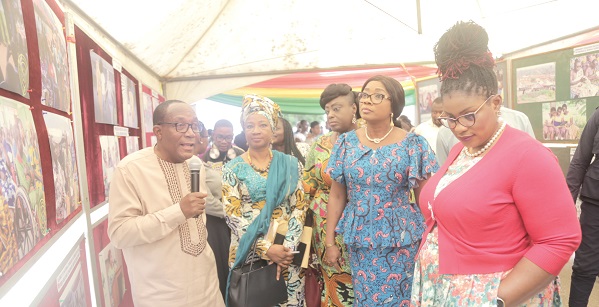
Gender Ministry implements pro-poor programme
The Ministry of Gender, Children and Social Protection, in collaboration with the Ministry of Local Government and Rural Development, has commenced the implementation of a project to improve social safety nets and productive inclusion of the poor and the vulnerable in the country.
Known as the Ghana Productive Safety Net Project, the initiative replaces the Ghana Social Opportunity Project.
Advertisement
The sector Minister, Mrs Cynthia Maamle Morrison, announced this when she took her turn at the monthly meet-the-press series by the Ministry of Information in Accra yesterday.
The safety net project is designed to reduce poverty, create jobs and enhance the social and economic lives of the less-privileged.
Achievements
Enumerating some of the achievements of the ministry, Mrs Morrison mentioned the promulgation of laws and policies to facilitate gender mainstreaming and the promotion and protection of vulnerable people in society.
She said significant progress had also been made in the review and finalisation of an Affirmative Action Bill, with inputs from stakeholders.
The minister said the final draft of the bill, which would be submitted to Cabinet for consideration and approval, had also incorporated issues of ‘ladies with disabilities’ to help safeguard their space in society.
She said the ministry had also introduced a joint spot check mechanism to track the achievements and challenges in the implementation of its social intervention programmes, such as the Livelihood Empowerment Against Poverty (LEAP), the Ghana School Feeding Programme and gender, disability and child protection mainstreaming activities in selected metropolitan, municipal and district assemblies (MMDAs) across the country.
Mrs Morrison said the ministry had further developed a digitised electronic monitoring and reporting system for LEAP which had been deployed to all 260 MMDAs to ensure the timely submission of LEAP reports by district social welfare officers.
It would also enable the LEAP management secretariat to conduct real-time monitoring to track programme implementation at the community level, she added.
According to the minister, the Ghana Productive Safety Net Project would enhance coordination and collaboration of all programmes being implemented by the ministry to ensure harmony and the judicious utilisation of resources.
On human trafficking, she said a series of community dialogues and sensitisation programmes were carried out to increase awareness of and education in human trafficking and irregular migration.
“The ministry, in 2018, rescued and gave care to 332 victims of human trafficking. Out of that number, 252 were children and 80 adults,” she added.
She said 82 cases of human trafficking were investigated, out of which 23 people were convicted, with 13 of them being child labour-related offences.
Mrs Morrison also said her outfit sensitised two Appeals Court judges and 75 High Court judges in Accra and Kumasi to modern trends of human trafficking.
School feeding
In fulfilment of the UN Sustainable Development Goal Two (SDG 2) to end hunger, achieve food security and improve nutrition through the promotion of agriculture, the ministry trained 5,711 caterers under the School Feeding Programme in the Northern, North East, Savannah, Upper East and Upper West regions, she said.
“So far, 3,023 schools across the country have been monitored to check enrolment and the quality and quantity of food served, including the kitchen environment.
“Again, in line with the government’s vision of ‘an agenda for jobs’, 25,053 people were employed under the School Feeding Programme,” the minister further said.
The ministry also opened Domestic, Sexual and Gender-Based Violence (DV/SGBV) Rapid Response centres which were being piloted at the Agbogbloshie and the Madina markets in Accra, she added.
The centres, she explained, also served as resource centres for market women who were sensitised to issues of domestic, sexual and gender-based violence.
Collaboration
Mrs Morrison attributed the ministry’s remarkable achievements to enhanced collaboration and partnership with stakeholders, including development partners and the media.



